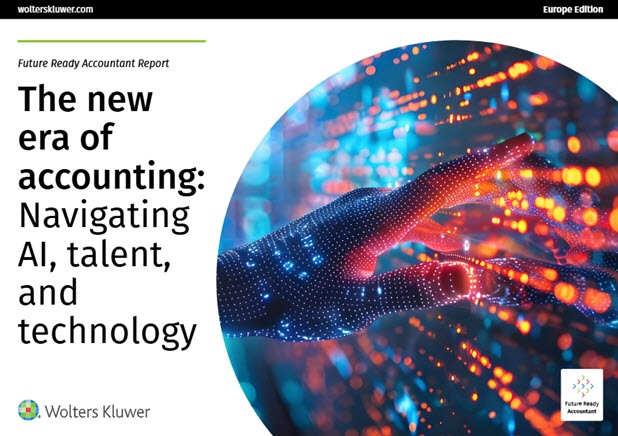Key findings:
- 57% of European accounting professionals believe AI advances will have the greatest impact on the profession
- 74% of accounting professionals are confident in their firm’s ability to respond to regulatory changes
- 62% of firms use cloud technology, with the Netherlands leading at 55% fully cloud-based
- 45% of firms cite balancing workload and employee wellbeing as their top talent concern
- 36% of European firms prioritize increasing digital document collection to meet goals
The accounting profession stands at a critical inflection point. According to a comprehensive new report from Wolters Kluwer, which surveyed 2,373 tax and accounting professionals across Europe, the industry faces transformation across multiple fronts – from artificial intelligence adoption to talent management and regulatory compliance.
While more than half (57%) of accounting professionals believe AI advances will have the greatest impact on the profession, adoption remains in early stages, with only 27% currently using AI in their workflow and another 22% planning to start in the next year. This gap between expectation and implementation is particularly notable as firms grapple with concerns about data security, accuracy, and implementation costs.
The cloud technology landscape shows greater maturity, with the Netherlands leading adoption – 55% of Dutch firms are fully cloud-based, significantly ahead of other European markets. However, data security concerns persist as a top challenge, with 47% of firms citing it as a key concern for cloud adoption.
In the talent arena, balancing workload and employee well-being emerges as the primary challenge for 45% of firms. To address these challenges, firms are implementing competitive salary packages (38%), flexible work arrangements (37%), and professional development opportunities (35%). The report finds that 61% of firms believe reducing mundane tasks through automation can create more capacity for engaging and strategic work.
Regulatory complexity presents another significant challenge, with 43% of European firms citing it as their top issue. This is particularly pronounced in Sweden (66%), Belgium (54%), and Italy (50%). The report shows that despite these challenges, approximately three-quarters of firms express confidence in their ability to adapt to regulatory changes.
E-invoicing represents a key area of digital transformation across Europe. In Italy, where e-invoicing is mandatory, 82% of firms exclusively use e-invoicing and 12% combine it with paper methods. The shift to digital invoicing faces several hurdles, with technical readiness being the primary concern – 40% of firms cite this as their main challenge, with particularly high rates in Belgium (50%) and Germany (51%).
In terms of advisory services, a clear trend emerges from the data. Currently, 83% of firms offer advisory services either as a core service (49%) or upon request (34%), with 20% planning to expand these services further. This expansion reflects the broader transformation of accountants into business advisors, particularly evident in Italy where 60% of firms predict this transition will have the greatest impact on their profession over the next five years.
The adoption of artificial intelligence varies significantly by firm size. The report shows that 76% of professionals at large firms (50-plus employees) report positive feelings about AI adoption, compared to 64% of midsize firms (20-49 employees), 54% of small firms (5-19 employees), and 38% of micro firms (1-4 employees).
Looking ahead, firms are setting clear priorities for growth. The survey reveals that 52% of firms cite increasing profitability and revenue growth as their primary goal. This is followed by improving client service (41%), expanding client base (40%), streamlining workflows (33%), and attracting and retaining talent (27%).
“While the accounting industry increasingly recognises AI’s transformative potential, implementation is ongoing,” notes Bas Kniphorst, EVP & Managing Director at Wolters Kluwer Tax & Accounting Europe. “Firms tackling these challenges and embracing AI will likely gain a competitive edge, while firms that delay may find themselves at a disadvantage sooner than expected.”
Digital transformation continues to gain momentum across the region, with 47% of European firms planning to move fully or partially to the cloud. However, implementation varies significantly by country. The Netherlands leads in cloud adoption with 55% of firms fully in the cloud, while other countries show more modest adoption rates.
The report concludes that successful firms will need to balance multiple priorities: embracing technological change, developing talent, and expanding service offerings. With 91% of firms expressing confidence in their ability to meet client needs, the industry appears well-positioned to navigate these changes, despite the challenges ahead.
This transformation represents a pivotal moment for the accounting profession in Europe. As firms navigate the intersection of artificial intelligence, talent management, and regulatory compliance, their ability to adapt while maintaining high service standards will determine their success in this new era of accounting.

